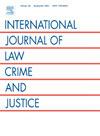Jurisdiction in online speech crime cases in the European Union
IF 1.4
4区 社会学
Q3 CRIMINOLOGY & PENOLOGY
International Journal of Law Crime and Justice
Pub Date : 2025-01-13
DOI:10.1016/j.ijlcj.2024.100718
引用次数: 0
Abstract
This paper presents a new approach to jurisdiction over online communication-related crimes. It argues that, considering the protective aims of penal law and the unique nature of speech, asserting jurisdiction based on territorial connections is unjustified in this context. Drawing from jurisprudence, philosophy of law, and linguistics, it emphasizes that for speech to be performed, it requires not only intentional conduct by the perpetrator but also the necessary engagement of recipients who, by means of interpretive strategies, recognize this behavior as intentionally expressing the perpetrator's mental experiences. They need not be the direct victims of speech; however, through the recognition they performed, they can be influenced by it. Therefore, it concludes that the jurisdiction most relevant for evaluating speech is that of the state with the closest connection to those recipients. Additionally, it describes how such an approach would facilitate the European Union's efforts in combating harmful on-line expression.
欧盟网络言论犯罪案件的管辖权
本文提出了一种新的网络通信犯罪管辖方法。它认为,考虑到刑法的保护目的和言论的独特性质,在这种情况下,主张基于领土联系的管辖权是不合理的。从法理学、法律哲学和语言学的角度出发,它强调要实现言语,不仅需要行为人的故意行为,还需要接受者的必要参与,通过解释策略,接受者认识到这种行为是有意表达行为人的心理体验。他们不必成为言论的直接受害者;然而,通过他们的表现,他们可能会受到它的影响。因此,它得出的结论是,与评价言论最相关的管辖权是与这些接受者有最密切联系的州的管辖权。此外,它还描述了这种方法将如何促进欧盟打击有害网络言论的努力。
本文章由计算机程序翻译,如有差异,请以英文原文为准。
求助全文
约1分钟内获得全文
求助全文
来源期刊
CiteScore
2.70
自引率
0.00%
发文量
25
审稿时长
47 days
期刊介绍:
The International Journal of Law, Crime and Justice is an international and fully peer reviewed journal which welcomes high quality, theoretically informed papers on a wide range of fields linked to criminological research and analysis. It invites submissions relating to: Studies of crime and interpretations of forms and dimensions of criminality; Analyses of criminological debates and contested theoretical frameworks of criminological analysis; Research and analysis of criminal justice and penal policy and practices; Research and analysis of policing policies and policing forms and practices. We particularly welcome submissions relating to more recent and emerging areas of criminological enquiry including cyber-enabled crime, fraud-related crime, terrorism and hate crime.

 求助内容:
求助内容: 应助结果提醒方式:
应助结果提醒方式:


